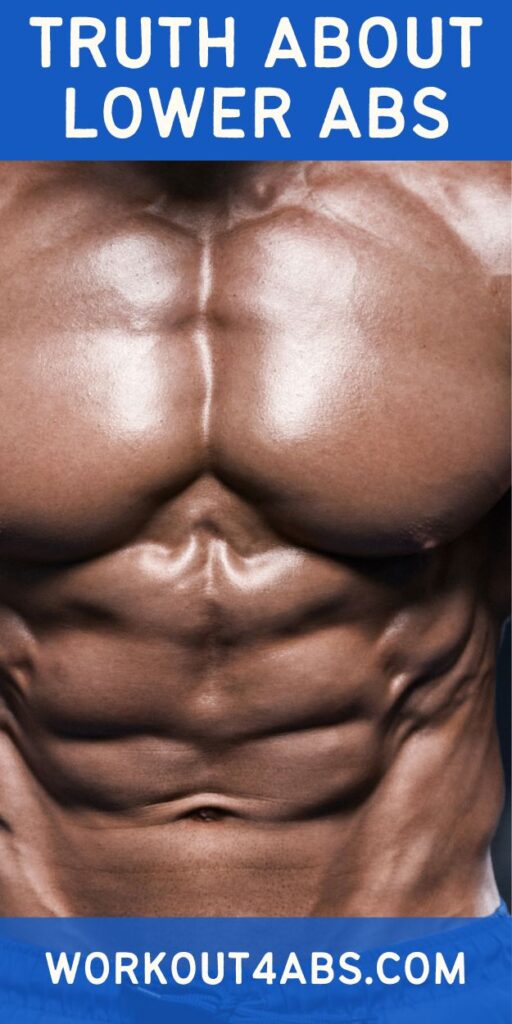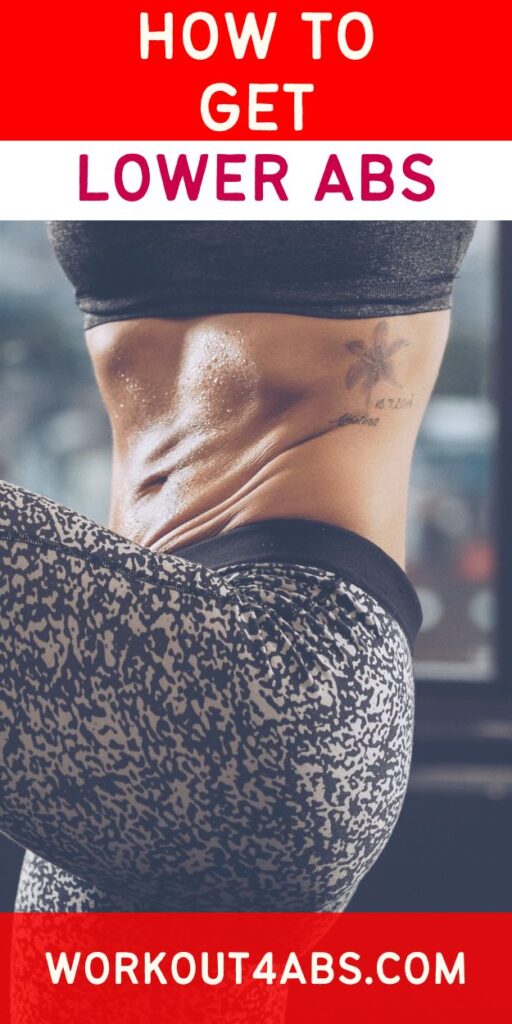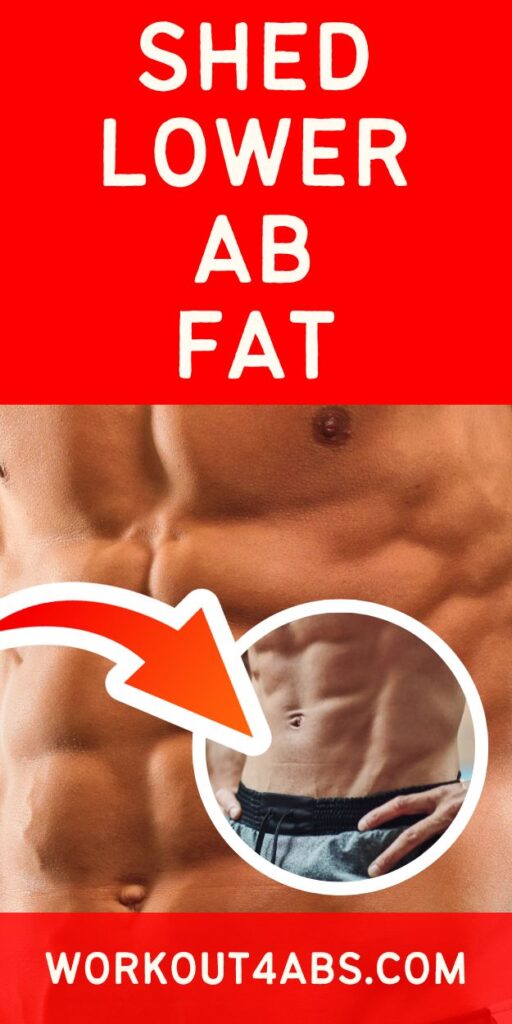Discover how to lose lower body fat in the pursuit of an extremely low body fat percentage. We will discuss how one often encounters a myriad of side effects that extend beyond the aesthetic goals. In this article, we delve into the challenges and potential drawbacks of fixating on losing lower abdominal fat and why a broader perspective on overall health is paramount.
The TRUTH About Losing Lower Ab Fat (NO B.S)
If you enjoyed these tips, please save this pin to your Pinterest Board.

You Need a Certain Amount of Body Fat for Survival
It’s important to understand that having some lower belly fat is entirely normal and, in fact, essential for the body’s proper functioning. The goal of having a completely flat lower belly may not be the healthiest or most realistic aspiration for everyone. Here’s why:
- Survival Mechanism: The human body is inherently programmed for survival. Throughout our evolution, having some fat stored in the lower belly and other areas served as an energy reserve to sustain us during times of scarcity and famine. This stored fat was crucial for survival when food was not readily available.
- Essential Functions: Body fat, including the fat stored in the lower belly, serves various vital functions. It acts as insulation to regulate body temperature, cushions and protects internal organs, and plays a role in hormone regulation and overall metabolic health.
- Individual Variation: It’s essential to recognize that people have different body shapes and genetic predispositions. Some individuals naturally carry more fat in certain areas, including the lower belly, due to genetic factors and hormonal influences. Attempting to achieve an extremely low body fat percentage can be unrealistic and unhealthy for many people.
- Health Over Appearance: Instead of fixating on achieving a perfectly flat lower belly, it’s more productive to focus on overall health and well-being. Maintaining a balanced and nutritious diet, regular physical activity, and a sustainable lifestyle are key factors in promoting good health.
- Spot Reduction is a Myth: It’s important to note that spot reduction, the idea of targeting fat loss from specific areas of the body through exercise, is a myth. The body tends to lose fat in a pattern that is genetically predetermined. Engaging in full-body workouts and cardio exercises can help reduce overall body fat, including in the lower belly area.
- Body Composition Matters: Instead of solely focusing on losing fat, consider paying attention to body composition. Building muscle through resistance training can help reshape your body and give the appearance of a flatter lower belly, even if some fat remains.
In conclusion, it’s perfectly normal to have some lower belly fat, and striving for an extremely flat lower belly may not align with the body’s natural programming and individual genetic factors. Prioritizing overall health, fitness, and body composition over appearance alone is a more balanced and sustainable approach to well-being. Embrace your body’s natural diversity and focus on living a healthy and active lifestyle that suits your unique needs and goals.
If you enjoyed these tips, please save this pin to your Pinterest Board.

As You Get Leaner and Leaner, Dropping Body Fat Percentage Becomes More Difficult
As you strive to become leaner and reduce your body fat percentage, you may encounter the phenomenon where each subsequent percentage of body fat becomes disproportionately more challenging to shed. This is due to the body’s natural survival mechanisms and its resistance to extreme leanness. Here’s why this happens:
- Survival Instinct: The human body has evolved over millions of years with a primary goal of survival. It’s hardwired to maintain a certain amount of body fat as an energy reserve for times of scarcity. When you start to approach very low body fat levels, your body perceives this as a potential threat to its survival.
- Set Point Theory: The body has a concept known as a “set point” – a specific level of body fat it’s comfortable maintaining for optimal functioning. When you try to push your body fat percentage below this set point, it triggers various physiological responses to defend against further fat loss.
- Hormonal Changes: As body fat decreases, hormonal changes occur that encourage fat retention and muscle loss. Leptin, a hormone that regulates hunger and metabolism, decreases, signaling to your body that it’s in a state of energy deficit, which prompts it to conserve fat.
- Metabolic Adaptation: The body adapts to lower calorie intake by slowing down the metabolism. It becomes more efficient at using fewer calories to perform daily functions, making it harder to create a calorie deficit for fat loss.
- Muscle Loss: In an effort to conserve energy, your body may break down muscle tissue for fuel, further reducing your metabolic rate and making it harder to lose fat.
- Psychological Stress: Extreme leanness can lead to psychological stress, impacting mood, sleep, and overall well-being. This stress can trigger emotional eating and hinder weight loss efforts.
- Potential Health Risks: Pursuing very low body fat levels can pose health risks, including nutrient deficiencies, hormonal imbalances, and a weakened immune system.
It’s crucial to understand that pushing your body to extremely low body fat levels is not sustainable or healthy for most people. The body is simply trying to protect itself, and its hardwired systems have no concept of aesthetics or fitness goals.
A more balanced approach to health and fitness includes achieving a body composition that is sustainable and aligned with your overall well-being. This may involve finding a healthy balance between leanness and maintaining a reasonable level of body fat that allows for optimal health and functioning. Consulting with a healthcare professional or fitness expert can help you set realistic goals and develop a safe and sustainable approach to reaching them.
Side Effects of Getting Extremely Lean
Getting extremely lean, especially to the point of very low body fat percentages, can have several side effects and challenges, many of which are related to the body’s natural responses to extreme calorie restriction and fat loss. Here are some of the common side effects of becoming extremely lean:
- Increased Hunger: As you reduce your calorie intake to achieve very low body fat levels, your body’s hunger signals may intensify. You may experience frequent and strong cravings, which can be difficult to manage.
- Less Energy: Extreme calorie deficits can lead to a significant drop in energy levels. You may feel fatigued, lethargic, and have reduced stamina for daily activities.
- Reduced Strength in the Gym: Severe calorie restriction and low body fat can result in muscle loss, impacting your physical strength. You may find it challenging to lift heavy weights or perform at your previous strength levels in the gym.
- Cognitive Impairment: Very low-calorie diets can affect cognitive function. You may experience difficulty concentrating, reduced mental clarity, and slower reaction times.
- Decreased Sex Drive: Extreme leanness can lead to hormonal imbalances, including reduced levels of sex hormones such as testosterone. This can result in a decreased libido and sexual function.
- Poor Sleep Quality: Low body fat levels and calorie restriction can disrupt sleep patterns. You may have trouble falling asleep or staying asleep, which can negatively impact your overall well-being.
- Mood Disturbances: Extreme diets and low body fat levels can contribute to mood swings, irritability, and even symptoms of depression or anxiety.
- Hormonal Imbalances: Very low body fat levels can disrupt the balance of hormones in your body, leading to irregular menstrual cycles in women and hormonal issues in both men and women.
- Immune System Suppression: Extreme leanness can weaken the immune system, making you more susceptible to illness and infections.
- Loss of Bone Density: In some cases, extreme leanness may lead to decreased bone density, which can increase the risk of fractures and osteoporosis.
It’s important to emphasize that the extent and severity of these side effects can vary greatly from person to person, and not everyone will experience all of them. Furthermore, extreme leanness is not necessary for good health or fitness and may not be sustainable or healthy for most individuals.
Maintaining a balanced approach to health and fitness, focusing on sustainable weight loss and body composition goals, and consulting with healthcare professionals or nutrition experts when necessary can help mitigate these side effects and promote overall well-being. Prioritizing your health and long-term quality of life should always be the primary goal.
If you enjoyed these tips, please save this pin to your Pinterest Board.

Home › Aesthetic Body Plan ›Lose Lower Body Fat